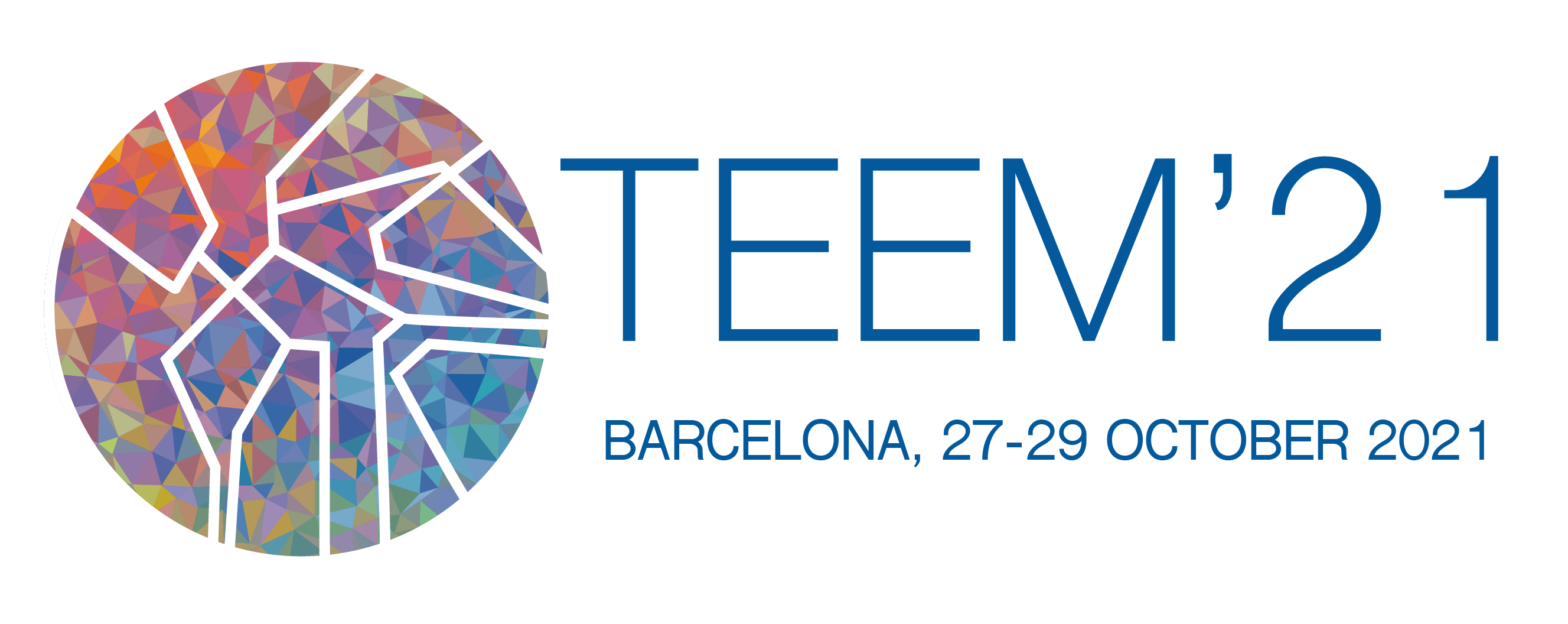Presentation
As has become a tradition, this year’s edition of TEEM has moved to Barcelona, where this track will be held once again. In the last edition, due to the effect of the pandemic, one of the main topics addressed by the researchers was the effect of COVID19 for the assessment of the students in formal education contexts, a topic that we hope to continue developing this year reflecting the interest of the research community in the exploration of the ramifications of the new situation that we are still experience and its effects in the middle and long term.
In the previous editions, we have also presented the advances of the studies in Educational Assessment conducted by our research team belonging to the IUCE at the University of Salamanca, as well as those of other national teams specialised in educational assessment and guidance, such as the Universities of Cádiz, Málaga, Córdoba, Oviedo, Burgos, León, etc. In this edition, we also would like to still receive contributions from international teams, who will contribute with interesting advances in educational fields as relevant as the assessment of programmes, schools and institutions, or the impact of educational actions on learning.
Nowadays, educational evaluation constitutes a key element to improve the quality of any programme or, in its broadest sense, the quality of the education system as a whole. In this track, we seek to share methodologies and research results about diverse assessment objects, whose aim is to improve the education system, both at University and non-university levels. On the other hand, this track will present some research experiences in the fields of evaluation and educational guidance.
Topics
This track aims to present studies and to foster a discussion among the scientific community on the following topics related to the methodology and results of research in educational assessment:
- Assessment methodology of digital skills
- Assessment methodology of mathematics skills
- e-assessment to e-learning
- Evaluation of the educational system
- Large-scale assessments
- Value-added and quality in education
- Innovation in e-assessment
- International models in program evaluation in education
- Feedback and feedforward in evaluation
- Culturally responsive assessment
Track Instructions and Program (Friday 29th, VIRTUAL, 9.00-10.30 Local Time, Support place B: Class 3.4, floor 3)
This year, track 14 will be fully virtual and the speakers will make their presentations sharing their screens, they we will have 10 minutes for each presentation with a time for questions after all presenters have finished.
The order of the presentations will be:
- ID 17: Empathy, creativity, and feelings using a modern board game. A learning experience valued by physiotherapy students.
- ID 33: COVID-19 AND THE EDUCATIONAL AREA: EMOTIONAL MANAGEMENT AND WELL-BEING IN TEACHERS
- ID 51: Randomized evaluation of reading skills: an opportunity for systematic literature review
- ID 46: Critical thinking, empathy and problem solving using a modern board game. A learning experience valued by physical therapy students.
- ID 122: Expert Validation of e-Open for Assessing Open Education Competencies. An instrument designed within the framework of UNESCO recommendations
- ID 123: Experts’ Judgment for Evaluation of an E-Learning Entrepreneurship Course in Higher Education
- ID 156: Methods for the evaluation of social learning (2017-2021): systematic literature review
Track Scientific Committee
María José Rodríguez Conde (University of Salamanca, Spain) – Chair
Susana Olmos Migueláñez (University of Salamanca, Spain) – Chair
Joe O’Hara (EQI – The Centre for Evaluation, Quality and Inspection, Dublin City University, DCU) – Chair
José Carlos Sánchez Prieto (University of Salamanca, Spain) – Chair
María José Vieira Aller (University of León, Spain)
Alicia Chaparro Caso López (Instituto de Investigación y Desarrollo Educativo, Universidad Autónoma de Baja California, México)
Javier Vidal García (University of León, Spain)
Eduardo García Jiménez (University of Sevilla, Spain)
Eva María Torrecilla Sánchez (University of Salamanca, Spain)
Camino Ferreira Villa (University of León, Spain)
Fernando Martínez Abad (University of Salamanca, Spain)
Agustín Rodríguez Esteban (University of León, Spain)
Gregorio Rodríguez Gómez (University of Cádiz, Spain)
Ignacio González López (University of Córdoba, Spain)
Jaione Cubero Ibáñez (University of Cadiz, Spain)
Jennifer C. Greene (Educational Psychology, University of Illinois at Urbana-Champaign, EEUU)
José Ortega Mohedano (Deggendorf Institute of Technology, Deggendorf, Alemania)
Luiz Lizasoain Hernández (University of País Vasco)
Maddalena Taras (Faculty of Education and Society, University of Sunderland, UK)
Mª Esperanza Herrera García (University of Salamanca, Spain)
María Soledad Ibarra Sáiz (University of Cadiz, Spain)
Diego González Rodríguez (University of León, Spain)
Miguel Ángel Gómez Ruiz (University of Cadiz, Spain)
Adriana Gamazo (University of Salamanca, Spain)
Cristina Frade Martínez (University of Salamanca, Spain)
